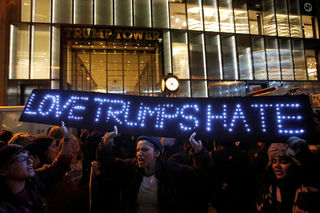Relationships
The Irony of Expressing "Love Trumps Hate" in Hate
"Love Trumps Hate" doesn't trump hate if we act out of hate
Posted January 16, 2017

This is a photo that accompanied an article entitled Autocracy: Rules for Survival. The article was written by Masha Gessen, and published online in the New York Review of Books. The photo depicts protesters assembled outside of Trump Tower on the day after the Presidential election. The article is based on the idea that Trump will rule as an autocrat, and offers six rules for surviving his tenure. The article was no-doubt fueled by sadness, anger and fear. While I essentially found myself in agreement with the article, I was struck with the seeming contradiction expressed by the photograph.
What might Martin Luther King have said about this photograph?
It is unlikely that the author selected the photo that accompanied her piece. The major irony of the photo, of course, is the contrast between the words conveyed by the placard (“Love Trumps Hate”) and emotion expressed on the face of the woman holding it. While the poster calls for the power of love over hate, there is little that might be called love that can be found in the woman’s face. Her anger may be understandable – it is even possible that the anger displayed in the photograph is accompanied by love. However, despite the sentiment conveyed by “Love Trumps Hate”, the photo reinforces rather than refutes the “us versus them” polarization of current political discourse.
The photo does not seek to use the power in love as a means to reconcile the deep fissures that separate Americans. Instead, it functions as yet another round of the “can’t you people see the error of your ways?” mode of discourse that has produced and continues to sustain our current political divide. The poster communicates not, “We must all act out of love for each other -- even for those whose positions we hate and wish to oppose", but instead, “You 'others' are haters! Can’t you see that ‘love trumps hate’? Renounce your hate and accept our ideology!” That’s not love. That’s hate (or at least anger) hiding behind love. It uses the concept of “love” as a weapon of political battle.
Anger is certainly understandable and acceptable. Anger fuels opposition against injustice. But if I accuse you in anger of being a "hater", I am not demonstrating how acting out of love can heal.
What would it mean to genuinely invoke love as a way to address our deep political differences? Happily, we already have a powerful example of how to do this. It is one of our deepest shames as a nation that we have failed to draw upon the example of the person who lived the ideology of loving engagement. The example, of course, is the message of Martin Luther King Jr.
In his Where Do We Go From Here? speech, delivered in 1967 to the Southern Christian Leadership Conference in Atlanta Georgia, King uttered these famous words:
What is needed is a realization that power without love is reckless and abusive, and that love without power is sentimental and anemic. Power at its best is love implementing the demands of justice, and justice at its best is love correcting everything that stands against love. And this is what we must see as we move on.
For King, love and power were not polar opposites. It is an error to think of love as weak and power as strong. King advocated social change through love, but did so without compromising his agenda. And he did so in a way that renounced violence and hate toward those whom he opposed and who opposed him. He was able to do this because his love was backed with an uncompromising strength of conviction that gave him the moral authority to transform what was wrong in the society in which he lived.
Willing to put his words into action, King acted with compassion toward to those who hated him, even while calling them out on their hate. Conversely, he was willing to suffer the consequences of his convictions without resorting to violence. He was jailed twenty-nine times, and used his incarcerations to shame those who acted unjustly toward him. Had King resorted to violence, his message would have surely been discredited, and we would not have made the progress that we have made in race relations.
The message raised by the protestor in the photo is correct: love trumps hate. But the medium here is surely the message. If “Love Trumps Hate” is delivered with hate, rather than with love and moral power, the message will not only be lost – it will generate still more anger and hate.
In 2017, we still have much to learn from Martin Luther King.


